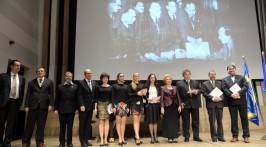On 19 January, the Budapest Music Centre hosted a commemoration to mark the seventieth anniversary of the disappearance of the late Swedish ambassador Raoul Wallenberg, Sweden’s former ambassador to Hungary who saved thousands of Jews from deportation during the Holocaust.
The commemoration, entitled “Raoul Wallenberg – Making a Difference – An Evening of Remembrance and Tolerance”, was held by Swedish Ambassador to Hungary H. E. Mr. Niclas Trouvé in the presence of the Speaker of the Swedish Parliament (Riksdag) Urban Ahlin and Deputy Speaker of the Hungarian National Assembly Márta Mátrai.
Speaking of the recipients of this year’s Raoul Wallenberg Awards, presented jointly by the Raoul Wallenberg Society, the Raoul Wallenberg Foundation, the Ministry of Human Reources and the National Association of Municipal Self-Governments, Parliamentary State Secretary at the Ministry of Human Resources Bence Rétvári branded those honoured “ambassadors of humanity”, adding that the Wallenberg Award is presented to people who actively assist the coexistence of various ethnic and religious groups and in the overcoming of prejudice.
This year’s awards went to Lutheran pastor Péter Bakay, director of the church’s Roma mission, Episcopal pastor Albert Durkó, head of the Hungarian Episcopalian Church’s national Roma mission, Reformed prison pastor Jonathan Sándor Szénási, history teacher and textbook author Gyula Hosszú, history teacher and Holocaust exhibition organiser Mária Baráth, and the municipal government of the town of Vác for its assistance to the Roma community and its support in preserving Jewish culture.
Raoul Wallenberg disappeared on 17 January 1945, on his way from Budapest to the eastern city of Debrecen. He is believed to have been abducted by Soviet troops and evidence suggests that he died in prison in the Soviet Union two years later.

